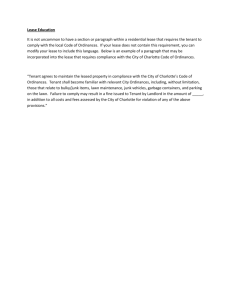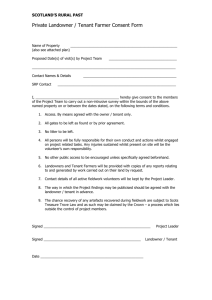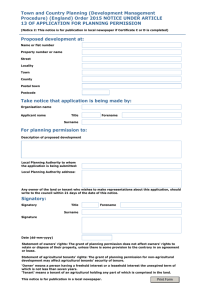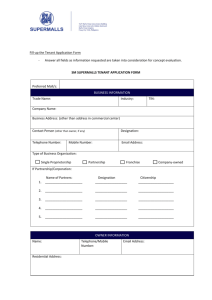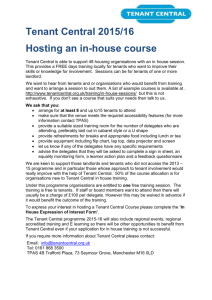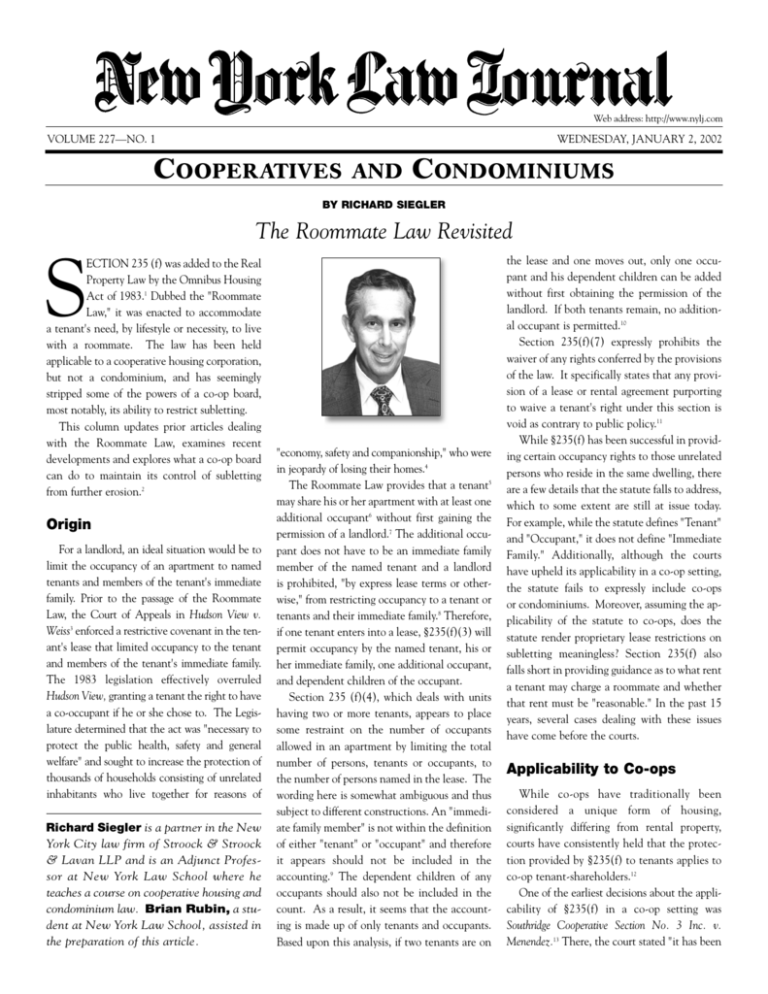
Web address: http://www.nylj.com
VOLUME 227—NO. 1
WEDNESDAY, JANUARY 2, 2002
C OOPERATIVES
AND
C ONDOMINIUMS
BY RICHARD SIEGLER
The Roommate Law Revisited
S
ECTION 235 (f) was added to the Real
Property Law by the Omnibus Housing
Act of 1983.1 Dubbed the "Roommate
Law," it was enacted to accommodate
a tenant's need, by lifestyle or necessity, to live
with a roommate. The law has been held
applicable to a cooperative housing corporation,
but not a condominium, and has seemingly
stripped some of the powers of a co-op board,
most notably, its ability to restrict subletting.
This column updates prior articles dealing
with the Roommate Law, examines recent
developments and explores what a co-op board
can do to maintain its control of subletting
from further erosion.2
Origin
For a landlord, an ideal situation would be to
limit the occupancy of an apartment to named
tenants and members of the tenant's immediate
family. Prior to the passage of the Roommate
Law, the Court of Appeals in Hudson View v.
Weiss3 enforced a restrictive covenant in the tenant's lease that limited occupancy to the tenant
and members of the tenant's immediate family.
The 1983 legislation effectively overruled
Hudson View, granting a tenant the right to have
a co-occupant if he or she chose to. The Legislature determined that the act was "necessary to
protect the public health, safety and general
welfare" and sought to increase the protection of
thousands of households consisting of unrelated
inhabitants who live together for reasons of
lr
g
ie
S
d
aichard Siegler is a partner in the New
h
c
R
R
York City law firm of Stroock & Stroock
& Lavan LLP and is an Adjunct Professor at New York Law School where he
teaches a course on cooperative housing and
condominium law. Brian Rubin, a student at New York Law School, assisted in
the preparation of this article.
"economy, safety and companionship," who were
in jeopardy of losing their homes.4
The Roommate Law provides that a tenant5
may share his or her apartment with at least one
additional occupant6 without first gaining the
permission of a landlord.7 The additional occupant does not have to be an immediate family
member of the named tenant and a landlord
is prohibited, "by express lease terms or otherwise," from restricting occupancy to a tenant or
tenants and their immediate family.8 Therefore,
if one tenant enters into a lease, §235(f)(3) will
permit occupancy by the named tenant, his or
her immediate family, one additional occupant,
and dependent children of the occupant.
Section 235 (f)(4), which deals with units
having two or more tenants, appears to place
some restraint on the number of occupants
allowed in an apartment by limiting the total
number of persons, tenants or occupants, to
the number of persons named in the lease. The
wording here is somewhat ambiguous and thus
subject to different constructions. An "immediate family member" is not within the definition
of either "tenant" or "occupant" and therefore
it appears should not be included in the
accounting.9 The dependent children of any
occupants should also not be included in the
count. As a result, it seems that the accounting is made up of only tenants and occupants.
Based upon this analysis, if two tenants are on
the lease and one moves out, only one occupant and his dependent children can be added
without first obtaining the permission of the
landlord. If both tenants remain, no additional occupant is permitted.10
Section 235(f)(7) expressly prohibits the
waiver of any rights conferred by the provisions
of the law. It specifically states that any provision of a lease or rental agreement purporting
to waive a tenant's right under this section is
void as contrary to public policy.11
While §235(f) has been successful in providing certain occupancy rights to those unrelated
persons who reside in the same dwelling, there
are a few details that the statute falls to address,
which to some extent are still at issue today.
For example, while the statute defines "Tenant"
and "Occupant," it does not define "Immediate
Family." Additionally, although the courts
have upheld its applicability in a co-op setting,
the statute fails to expressly include co-ops
or condominiums. Moreover, assuming the applicability of the statute to co-ops, does the
statute render proprietary lease restrictions on
subletting meaningless? Section 235(f) also
falls short in providing guidance as to what rent
a tenant may charge a roommate and whether
that rent must be "reasonable." In the past 15
years, several cases dealing with these issues
have come before the courts.
Applicability to Co-ops
While co-ops have traditionally been
considered a unique form of housing,
significantly differing from rental property,
courts have consistently held that the protection provided by §235(f) to tenants applies to
co-op tenant-shareholders.12
One of the earliest decisions about the applicability of §235(f) in a co-op setting was
Southridge Cooperative Section No. 3 Inc. v.
Menendez.13 There, the court stated "it has been
NEW YORK LAW JOURNAL
abundantly recognized in law that an occupancy
agreement or proprietary lease entered into by a
stockholder of a cooperative corporation is in
fact a lease by a tenant for residential rental
premises." The court also focused on similar terminology which appears in §235(b) of the Real
Property Law, which establishes an implied
warranty of habitability in every written or oral
lease entered into by a "landlord or lessor" and
a "tenant or lessee." Thus, the same analysis
employed by the courts in connection with
§235(b) can be used with §235(f), especially
since both establish provisions that are mandated by public policy. Consequently, the Southridge
court determined that the Legislature intended
to make §235(f) fully applicable to co-ops.
In Lincoln Guild Housing Corp. v. Stuckelman,14 the court echoed several prior decisions,
which determined that §235(f) overrides
proprietary leases for cooperative apartments
and makes certain lease provisions unenforceable. The court asserted that the relationship
between a co-op and proprietary lessee as that
of landlord and tenant was well established.15 It
explained, "where the Legislature wishes to
exclude proprietary leases from coverage by a
section of the Real Property Law, it specifically
carves out an exception, such as in RPL
§226(b)(3)." Therefore, the court held that due
to the growing trend to include co-op shareholders under the rubric of the landlord-tenant
law, in the absence of a specific exclusion for
cooperatives in §235(f), its benefit is extended
to co-op shareholders.16
Immediate Family
Though it provides explicit definitions
of "tenant" and "occupant," §235(f) fails to
define the term "immediate family." As a result,
questions arise. How broadly should the term
"immediate family" be construed? Where should
one look for guidance if forced to determine what
constitutes an "immediate family" member?
When confronted with this issue, courts have
uniformly interpreted it to encompass a wide
range of family members, including collateral relatives, certain in-laws, and stepchildren.17
The lower courts have read §2104.5(a)(1) of
the Rent and Eviction Regulations of the
Division of Housing and Community Renewal,
which apply in instances where the owner of an
apartment seeks to recover possession for his
own or his immediate family's use and occu-
WEDNESDAY, JANUARY 2, 2002
pancy, to apply in situations where §235(f) is at
issue. Section 2104.5(a)(1) defines the term
"immediate family" as including only:
a husband, wife, son, daughter, stepson,
stepdaughter, father, mother, stepfather,
stepmother, brother, sister, grandfather,
grandmother, grandson, granddaughter,
father-in-law, mother-in-law, son-in-law
or daughter-in-law.
An identical definition of "immediate family"
is also found in §2520.6(n) of the Rent
Stabilization Code of the City of New York.18
Subleasing
The enactment and subsequent development
of the Roommate Law has had a significant
effect on co-ops. One of the objectives of co-op
housing is to promote occupancy by those who
have an ownership stake in the housing
community. A typical proprietary lease
prohibits the subletting of a premises without
the prior consent of the co-op. Moreover, this
consent usually can be withheld for any or no
reason. In fact, §226(b) of the Real Property
Law, which requires a reasonable standard for
consenting to assignments or sublets pursuant
to a residential rent agreement, specifically
exempts proprietary leases from its coverage.
Section 226(b)(3) states that:
the provisions of this section shall apply
to leases entered into or renewed before
or after the effective date of this section,
however they shall not apply to public
housing and other units for which there
are constitutional or statutory criteria
covering admission thereto nor to a
proprietary lease, viz.: a lease to, or held
by, a tenant entitled thereto by reason of
ownership of stock in a corporate owner
of premises which operates the same on a
cooperative basis.
Section 235(f) contains no such similar
exclusion for co-ops. Thus, §235(f) appears to
permit a tenant-shareholder to circumvent (on a
limited basis) the most restrictive proprietary
lease sublet provisions. While the proprietary
lease may unequivocally state that the tenantshareholder may not sublet the unit without the
consent of the co-op, a shareholder may clearly
share the apartment with an "occupant" under
§235(f) without first obtaining the board's
consent. To this extent, the co-op has been
limited in its ability to maintain control over the
inhabitants of the housing community.
While a shareholder can co-habit with a
roommate without the board's consent, it is
uncertain whether he may benefit monetarily
from the roommate. The issue of whether an
occupant may be charged, an if so, how much is
not addressed in the statute. It has been
addressed in a rental situation.19 However, as of
yet, no court has addressed the issue in a co-op
setting. Since there is nothing in §235(f) which
sets forth what the financial arrangements
between the roommate and tenant must be, it is
conceivable that a tenant-shareholder may
utilize the Roommate Law for financial gain.
The power of a tenant-shareholder to
sublease without obtaining the consent of the
co-op, although seemingly protected to an
extent by §235(f), is not absolute. Courts have
customarily found that a shareholder must use
the unit as his or her primary residence for the
occupancy of a roommate to be valid.20 This
principle was enunciated in W. P. Owners Corp.
v. Caramihi,21 where the co-op sought to terminate the tenancy of proprietary lessees on the
grounds that they sublet their apartment without permission. The shareholders, who allowed
their niece to move into the apartment because
they were moving into a house, argued that the
niece was a roommate under §235(f) and thus
free to occupy the apartment alone. The court
found that, while the niece qualified as an
occupant under the Roommate Law, the shareholder's maintenance of the premises as his or
her primary residence was a prerequisite when
seeking to have another person occupy the
apartment. Thus, it is clear that the roommate's
right to possession is dependent on the continued occupancy by the tenant-shareholder.22
Similarly, in Mill Rock Owners Corp. v.
McEvoy, the court found that §235(f) is not
applicable if the tenant-shareholder does not
primarily reside in the subject premises.23 Only
occasionally were both shareholder and occupant occupying the unit simultaneously, and
each had alternate residences when they were
not occupying the subject premises. The court
noted that, under §235(f)(3), occupancy of the
tenant's immediate family and one additional
person is protected only where the tenant or
the tenant's spouse occupies the premises as
his or her primary residence; thus, under the
circumstances, the shareholder and occupant
"may not claim roommate protection under
NEW YORK LAW JOURNAL
RPL § 235(f)."24
The above cases demonstrate that courts have
unmistakably spoken to the issue, and as such,
the co-op shareholder must concurrently reside
in the unit with an occupant or family member
to enjoy the benefit of the Roommate Law. Thus,
co-op boards can rest a bit easier, knowing that
their tenants may not unconditionally sublease
their unit, without remaining in residence.
Section 235(f) is not an offensive mechanism for landlords.25 The First Department
of the Appellate Division has held that a
landlord may not terminate a tenancy solely
because the tenant has violated the Roommate
Law.26 However, the court recently ruled that
an owner may evict a tenant based on a violation of a lease clause that incorporates the
limitations set forth in the Roommate Law.27
This ruling has the potential to provide
assistance to co-op boards as they try to
maintain a certain level of control over the
residents of its co-op building.
Applicability to Condos
Although it has been made clear that
§235(f) applies to co-ops, a separate question
is whether the statute is applicable in a
condominium setting. It was thought that, since
there is no landlord-tenant relationship in the
condominium form of ownership, §235(f)
should not apply. Presently, it appears that New
York courts will treat co-ops and condominiums
differently for purposes of determining the
applicability of the Roommate Law.
In 1993, a court held that the Roommate
Law was inapplicable to condominium units.28
The action stemmed from a dispute concerning
a parking space in a condominium complex.
The plaintiff owned a condominium in the
complex and co-habitated with a gentleman
with no ownership stake in the unit. In June
1989, the condominium association installed a
remote control gate to its garage. Plaintiff had
a parking space in the garage that was used
primarily by his co-habitant. Thus, the plaintiff
applied for a remote control permitting him to
access the garage. The application was denied
on the ground that the vehicle which occupied
the space was registered in New Jersey to the
co-habitant, who had no ownership interest in
the condominium. Plaintiff then sued the
condominium association, alleging, among
other things, that §235(f) was applicable, and
WEDNESDAY, JANUARY 2, 2002
under the statute the association could not
deny his co-habitant a remote control and
access to the parking space.29
The court found that the Roommate Law
should not apply to this matter. It determined
that §235(f) "plainly states that it is effective
only between landlords and tenants in a
rental-type situation, and makes it clear that
the plaintiff "voluntarily entered into an
agreement to purchase a condominium unit
and voluntarily agreed to adhere to the by-laws
of the condominium and thus agreed to the
restrictions contained therein."30 It remains to
be seen whether another court will disagree
with this analysis.
Conclusion
It is clear that a co-op shareholder will be
afforded the protection of § 235(f), thus allowing certain flexibility (despite the terms of the
proprietary lease) in determining who may
share the premises without having to obtain
the permission of the co-op. It is probable that
courts will not find the Roommate Law
applicable in a condominium setting.
To some extent, many of the Roommate
Law's lingering issues have been answered, with
few uncertainties remaining. It seems that the
courts have determined that the definition of
an "immediate family" member can be found in
§2104.5(a)(1) of the Rent and Eviction Regulations, as well as in §2520.6(n) of the Rent
Stabilization Code. Through the provisos of
§235(f), a tenant-shareholder may circumvent
the consent process for subletting provided in
most proprietary leases, so long as the shareholder maintains the unit as his or her primary
residence. Additionally, it is apparent that
§235(f) is a shield for tenants and not a sword
to be used by landlords. A remaining uncertainty is whether and to what extent a co-op
shareholder may reap an economic benefit from
a roommate.
••••••••••••••
•••••••••••••••••
(1) L. 1983 Ch 403 at 1.
(2) See Siegler, "Legal Trends in Condos and Co-ops,"
New York Law Journal, Nov. 16, 1983 at 23, col. 6; Siegler,
"Development of the 'Roommate Law,'" NYLJ, July 5 1989,
at 3, col. 1; Siegler. "Update: Apartment Transfers, Subleases, Roommates," NYLJ, March 4, 1992 at 3, col. 1.
(3) 59 NY2d 733, 463 NYS2d 428 (1983).
(4) L. 1983 Ch 403 at 1.
(5) N.Y. Real Prop. Law §235(f)(1)(a) defines "Tenant"
as a person occupying or entitled to occupy a residential
rental premises who is either a party to the lease or rental
agreement for such premises who is either a party to the
lease or rental agreement for such premises or is a statutory tenant pursuant to the emergency housing rent control
law or the city rent and rehabilitation law or article sevenc of the multiple dwelling law.
(6) N.Y. Real Prop. Law §235(f)(1)(b) defines "Occupant" as a person other than a tenant or a member of a tenant's immediate family, occupying a premises with the consent of the tenant or tenant.
(7) N.Y. Real Prop. Law §235(f)(3) and (f)(4) (McKinney
2001).
(8) N.Y. Real Prop. Law §235(f)(2).
(9) N.Y. Real Prop. Law §235(f)(1) (McKinney 2001).
(10) See 425 Realty Co. v. Herrera, 146 Misc2d 790; 559
NYS2d 442 (App. T. 1st Dept. 1990).
(11) N.Y. Real Prop. Law §235(f)(7) (McKinney 2001).
(12) Sherwood Village Cooperative A Inc. v. Slovik, 134
Misc2d 922, 513 NYS2d 577 (Civ. Ct. Queens Co. 1986);
Hilltop Village Cooperative No. 4 Inc. v. Greenberg, NYLJ,
Oct. 27, 1988, at 26 col. 4; Lincoln Guild Housing Corp. v.
Stuckelman, NYLJ, April 9, 1992, at 24 col.4; Mill Rock
Owners Corp. v. McEvoy, NYLJ April 14, 1993, at 21 col.
(13) 141 Misc2d 823, 535 NYS2d 299 (Civ Ct. Queens
Co. 1988).
(14) Lincoln Guild Housing Corp. v. Stuckelman, NYLJ,
April 9, 1992, at 24 col.4. See also Siegler, "Development
of the 'Roommate Law," NYLJ, July 5 1989, at 3 col. 1;
Hauptman v. 222 E. 80th Street, 100 Misc2d 153, 418
NYS2d 728 (Civ.Ct. N.Y. County 1979) (noting that there
is no intention by the Legislature to exempt co-operatives
from the ambit of the warranty); Suarez v. Rivercross Tenant's Corp., 107 Misc2d 135, 438 NYS2d 168 (1st Dept.
1981) (stating that a "proprietary lessee is entitled to the
statutory protection as well as the non-investing, ordinary
tenant"); McMunn v. Stepping Stone Management Corp.,
131 Misc2d 340, 500 NYS2d 219 (Civ. Ct. N.Y. County
1986) (declaring "there is no doubt that the warranty
applies in co-operative apartments").
(15) Lincoln Guild Housing Corp. v. Stuckelman, NYLJ,
April 9, 1992, at 24 col.4.
(16) Id.
(17) See Mitchell Gardens No. 1 Cooperative Corp. v. Cataldo, 169 Misc2d 983, 647 NYS2d 389 (Civ.Ct. Queens County 1996); 38 Astoria Associates v. Chavez, 126 Misc2d 811,
484 NYS2d 267 (Civ.Ct. Queens County 1985).
(18) N.Y. Unconsol. Laws § 2520.6(n) (McKinney
2001). See also Ziegleman and Langfan v. Delgado, NYLJ,
Jan. 15, 1986 at 11, col.3, aff'd NYLJ, Nov. 20, 1986, at 11
col.3 (App. T. 1st Dept.); Ali Baba Hotel Corp. v. Seye, 162
Misc2d 1006, 619 NYS2d 243 (Civ.Ct. N.Y. County
1994).
(19) See Ram 1 LLC v. Mazzola, NYLJ, June 8, 2001 at 17,
col. 1. In Ram 1, the court, citing the newly amended Rent
Stabilization Code §2525.7, prohibited a tenant from charging a roommate more than the roommate's "proportionate
share" of the legal rent.
(20) See W. P. Owners Corp. v. Caramihi, NYLJ,
April 15, 1993, at 21, col. 2; See also N.Y. Real Property Law § 235(f)(3) and (4).
(21) Id.
(22) Id.
(23) NYLJ, April 14, 1993, at 25, col.5.
(24) Id.
(25) See Schneller v. Moed, 128 Misc2d 885; 491
NYS2d 574 (Civ. Ct. N.Y. County 1985).
(26) See Capital Holding Co. v. Stavrolakes, 684 NYS2d
477 (N.Y. Ct. App. 1998), aff'g, 242 AD2d 240, 662
NYS2d 14 (App. Div. 1st Dept. 1997)(concluding that §
235(f) sets forth minimum requirements for the benefit of
the tenant, and not a statutory limitation on the number
of permitted occupants; adding that subdivision nine of the
statute, which lists the remedies available for violations of
the section, gives no affirmative right of action to landlords).
(27) See Roxborough Apartments Corp. v. Becker, 187
Misc2d 604, 723 NYS2d 817 (App. T. 1st Dept. 2000).
(28) Smith v. Board of Managers, Leland Gardens Condominium, NYLJ, Nov. 16, 1993 at 25, col. 1.
(29) Id.
(30) Id.
This article is reprinted with permission from the
January 2, 2002 edition of the NEW YORK LAW
JOURNAL. © 2002 NLP IP Company. All rights
reserved. Further duplication without permission is
prohibited. For information contact, American
Lawyer Media, Reprint Department at 800-888-8300
x6111. #070-01-04-0024




